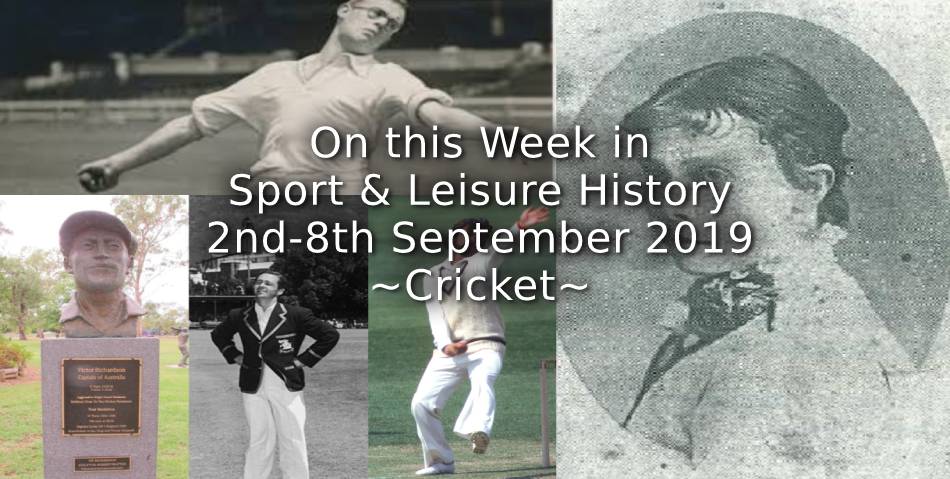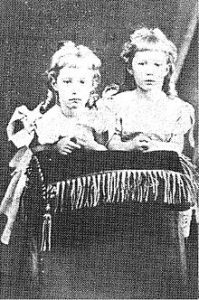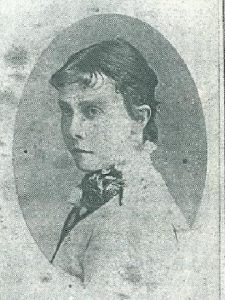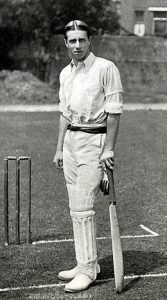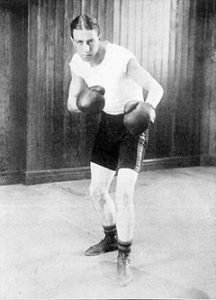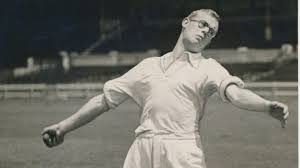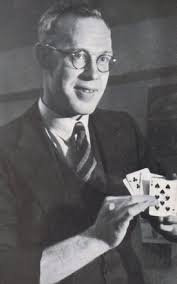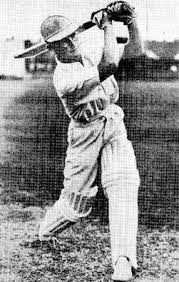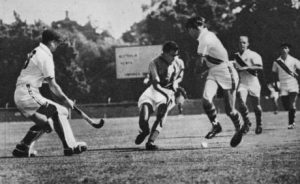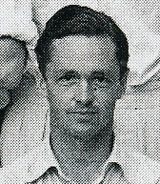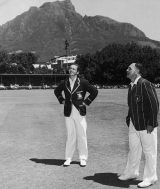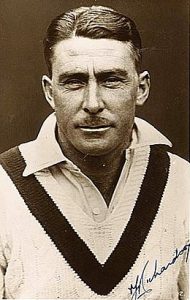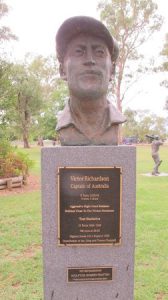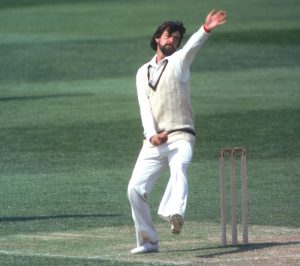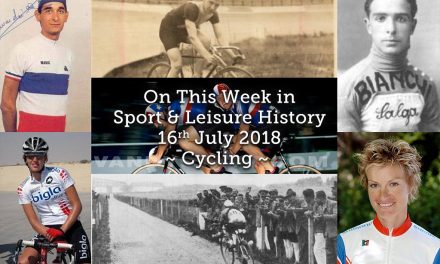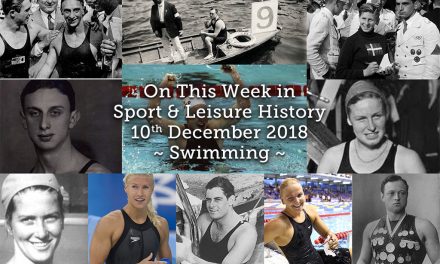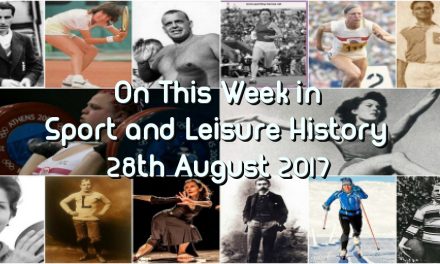2nd
Lily Poulett-Harris, who formed one of the first women’s teams in Australia and was responsible for inspiring many other women to take up the sport, was born on this day in 1873. Born Harriet Lily Poulett-Harris in Tasmania, she was the twin daughter of a Church of England priest and head of the Hobart Boys’ High School Richard Deodatus Poulett-Harris. Taught by her father, Lily came second in an 1884 exam set to decide who would be awarded the Newcastle Scholarship at her father’s school. She sat it as a “trial of strength” on the understanding that she was not actually eligible for the scholarship. There was cricket in her blood, with her father being a trustee of the Southern Tasmanian Cricket Association and her older brother Herbert an accomplished runner, footballer and cricketer. Herbert toured New Zealand with a Tasmanian cricket team in the 1880s. Lily eventually became a driving force behind the formation of the Oyster Cove Ladies’ Cricket Club in 1894. The women played in summer dresses, which were lighter than more formal attire but were still cumbersome and restrictive compared to modern cricket clothing. Although a newspaper reported that Oyster Cove was the first women’s organised cricket team in Australia at the time, there had been others. In 1886 the Fernleas Women’s Cricket Team played their first game against the Siroccos on March 8 of that year at the Association Ground, now known as the Sydney Cricket Ground, the match had been organised to raise money for the Bulli Relief Fund. The game doesn’t seem to have spawned regular women’s matches but it gained them precedence over the first English women’s team the White Heather Club, which was formed in 1887. While the Fernleas club may have been formed eight years before Poulett-Harris’s team, it seems to have been a one-off, created for a benefit match. Women’s cricket didn’t take off in Sydney the way it did in Tasmania, mainly thanks to the skill and determination of players such as Lily, other teams were soon formed over the ensuing years, inspired by the success of women’s cricket in Tasmania. Lily was a schoolteacher at a Ladies Grammar School in Hobart, accomplished in the musical field as well, she played violin and piano to a high level and juggled her concern and musical commitments with her cricket and teaching, until her death, probably from a form of tuberculosis in 1897.
- Lily Poulett Harris and her twin sister
- Lily Poulett-Harris,
3rd
The English cricketer and boxer Johnny Douglas was born today in 1882. The son of a wood-importer, his father’s firm supported his amateur status in cricket and boxing, and he also played football once for the England amateur side. An all-rounder, he played for Essex County Cricket Club between 1901 and 1928, captaining the captained the county from 1911 and was named Wisden Cricketer of the Year in 1915. He also played for England and captained the England team both before and after the First World War. He served in the Bedfordshire Regiment throughout World War I. Douglas captained England eighteen times, with a Test match record of: won eight, lost eight, drawn two. Successful as stand-in captain against Australia in 1911, he won the series 4–1. On the 1920/21 tour of Australia he led a depleted post-war side which suffered a 0–5 ‘whitewash’, a scoreline not repeated in an Ashes series until the 2006/7 England team lost by the same margin. Reappointed reluctantly by the MCC in 1921, he lost the first two Tests at home to Warwick Armstrong’s side and was displaced as captain but retained in the XI. He captained England in one further Test match, against South Africa in July 1924, and played his final Test on the 1924/25 England tour of Australia. As well as playing cricket, Douglas was a notable amateur boxer, While at school in Felsted, he won the 1901 Public Schools middleweight championship in 1905 and he took the ABA title. In contrast to his reputation as a defensive cricketer he was an aggressive boxer. Representing the Mincing Lane Boxing & Athletic Club and the Belsize Boxing Club, he claimed two KOs on his way to the 1908 Olympic middleweight final where he met the formidable Australian, Reginald ‘Snowy’ Baker. All three of his bouts, including the final, described by The Times as “one of the most brilliant exhibitions of skilful boxing, allied to tremendous hitting, ever seen.”, were held on the same day. The silver medal winner, some 44 years later falsely claimed that Douglas’s father was the sole judge and referee. In reality Douglas senior was at ringside, to present the medals, in his role as president of the Amateur Boxing Association of England. As part of his father’s timber firm, he often went to Scandinavia on timber-buying missions. In December 1930, Johnny and his father boarded the SS Oberon in Finland with the intention of being home for Christmas. Tragically, their boat was involved in a collision in the Kattegat and they were among the 22 passengers who drowned.
- Johnny Douglas
-
Johnny Douglas
Boxing at 1908 Olympics
4th
On this day in 1987, the cricket world mourned the death of one its greatest servants, when Bill Bowes passed away, aged 79. Born in Elland on 25 July 1908, to a railwayman whose job with the Lancashire and Yorkshire Railway caused the family to relocate on a regular basis, Bill spent the first two decades of his life living in Leeds where he accompanied his father to watch evening matches at the Armley club. His playing career began with Armley Wesleyan Sunday School and developed with Kirkstall Educational while he earned a living working in an estate agent’s office where he learned shorthand and typing, skills which were to be called on again later in life. Success as an accurate, quick bowler brought offers to become a professional cricketer, which would have seen him earn five times his office workers salary and he was persuaded by friends to write to Warwickshire seeking a trial. However before he could be called to Edgbaston he travelled to London where he impressed officials of the MCC and was offered a position on the ground staff. Lord Hawke, Yorkshire’s president, made an agreement with the MCC that Bowes could play for the county when his club duties permitted and in tandem with Hedley Verity, Bowes quickly established himself in the forefront of English bowling, claiming over 100 wickets in every season between 1931-39 with the exception of 1937, mainly due to an ankle injury. He first played for England in a one-off match against Test newcomers India at Lord’s in June 1932 and earned a place on Douglas Jardine’s tour of Australia in the winter of 1932-3 – the infamous “Bodyline” series. Together with Verity, he spearheaded the attack for Yorkshire, winning the County Championship every year between 1931 and 1939 apart from 1934, when they were fifth behind Lancashire, and two years later when Derbyshire became champions for the first time. In the season after the Second World War, during which Verity was killed in action and Bowes spent two-and-a-half years as a prisoner having being captured at Tobruk, Sellers led Yorkshire to another championship, with Bowes four and half stones lighter than he had been in 1939. To read “The greatest & most memorable match I ever played” the story of how during his captivity in a notorious Italian POW camp in World War Two, Bill and fellow English cricket Freddie Brown, staged one of the most remarkable cricket matches in history – click here. In the summer of 1946 he played his last Test and retired from cricket the following year. He began a successful second career as cricket correspondent, first with the Yorkshire Evening News then with the Yorkshire Evening Post. The typing and shorthand he had used so long ago at last proved their worth. He retired in 1973 but continued to write for Wisden, using his vast knowledge to address the issues of the day, reiterating his long-held view that clubs, rather than the county or international game, were at the heart of cricket.
- Bill Bowes in action
- Bill Bowes in later life
5th
Ian Dick, who was born on 30 August 1926 in Boulder, Western Australia, began his cricket career in the WACA District Cricket competition at an early age, and for the South Perth Cricket Club at the age of 12, as well as representing his school, Wesley College. He made his debut for West Perth during the 1944–45 season at the age of 18, but transferred back to South Perth the following season when the club was admitted to the first-grade competition. He later vice-captained South Perth, and holds the club record for the highest first-grade career runs total, he played one match for Western Australia in 1950 against Queensland, scoring a duck in the first innings and 27 runs in the second, He also captained Western Australia Colts in one match against the MCC in 1950. Dick was also a hockey player, making his debut for Western Australia in 1946, and his debut for Australia in 1948. He represented Australia in every match from 1948 to 1958, and captained the team at the 1956 Summer Olympics in Melbourne, scoring Australia’s first goal in Olympic competition. He was inducted in the Western Australian Hockey Hall of Champions in 1991, and was inducted into the Hockey Australia Hall of Fame in 2008. Ian’s brother Alexander also played cricket for Western Australia and South Perth, and another brother, David, captained Wesley College in 1936 and played for Western Australia. His uncle Billy Dick captained Carlton to the 1914 VFL premiership. Ian Dick died on this day in 2012 aged 86.
- Ian Dick
- Australia playing Kenya at the 1948 Olympics
6th
English cricketer George Mann was born today in 1917. He was the captain of Middlesex and England in the post-war years and during the Second World War was judged “the best regimental officer in the British Army”, and was awarded the DSO and the MC. A brewer by trade he was for 30 years a director first of Mann, Crossman and Paulin, which became absorbed into Watney, Mann. On retiring from the world of brewing in 1977 he served for 10 years as Deputy Chairman of Extel. The elder of two sons of F T Mann, who had led Middlesex and England at cricket in the 1920s, he was grounded in the game and with his brother John became successive Eton captains in 1936 and 1937. George, who went on to Pembroke College, played at Lords for Cambridge in 1938 and 1939. Their appearing together in the 1939 University Match was prevented when John, slightly the better cricketer, was put out of action by an eye infection. Both brothers joined the Scots Guards at the outset of war and emerged at the end as majors and winners of the Military Cross. For George, who won his MC in 1943, there was also another honour, a DSO. After the war, Mann helped Middlesex to win the Championship in 1947, before taking on the captaincy for the following two summers. He led the county to third place in 1948 and to a shared title with Yorkshire in 1949, scoring upwards of 1,000 runs each year in the wake of the prolific trio of Robertson, Edrich and Denis Compton, and proving a shrewd and popular captain. Between these two summers, however, fate had cast him in a higher role. England, captained by N W D Yardley, were overwhelmed by the extremely powerful Australians in 1948, the series ending with their being bowled out at the Oval for 52. With morale at rock bottom and Yardley unable to make himself available for the MCC tour to South Africa that autumn, Mann, although he had never played for England – or even come near to doing so – was appointed captain. In the first match at the Cape, MCC batted after Western Province had declared at 386 for four and had lost the best three batsmen cheaply before the new, untried captain went to the wicket. His response was a forceful, inspiring display wherein he reached his hundred with a six. England came to the Fifth and final Test at Port Elizabeth having narrowly won the First at Durban and drawn the next three. On the second day England were facing a big opening score, more than 200 behind with five wickets down. At this point the captain batted for nearly four hours and making a faultless 136 not out. On the last afternoon Dudley Nourse tried to snatch back the rubber for South Africa by declaring and setting England to make 172 to win in 95 minutes. Though the haste to beat the clock put his side in danger of defeat at several points, Mann’s orders were to continue to chase the runs. They got there by three wickets with a minute to spare, so concluding one of the best led tours within memory. Mann went on to captain England in the first two home Tests of 1949 against New Zealand, both drawn, contributing in the first at Headingley an innings of 49 not out in 25 minutes, including an enormous six reminiscent of his father which ended up on the football pitch behind the main stand. After the Second Test, in answer to a request by the selectors, he made it clear that he would be unavailable for England if chosen for the forthcoming tour to Australia. Mann resigned the captaincy of Middlesex following the finale to the 1949 County championship and played little but club cricket from then onwards. Gradually, though, he was drawn into the administration and governing councils of the game. In 1965-6 he chaired a group of Test cricketers and umpires charged with looking into the emotive subject of throwing. In the years following the devolution of authority by MCC and the formation of the Cricket Council and the TCCB, Mann’s fair-mindedness did much to ease relationships which at times were tense. For several years he combined membership of the MCC Committee with the chairmanship of both the TCCB and Middlesex – to the benefit of all three. He was appointed CBE in 1983 on his retirement after five years as chairman of the TCCB, the following year he became President of MCC and chairman of the International Cricket Conference.
- George Mann
-
George Mann & Dudley Nourse at the coin toss
South Africa v England, 3rd Test, Cape Town, January 1, 1949
7th
Victor Richardson, a leading Australian sportsman of the 1920s and 1930s, captaining the Australia cricket team and the South Australia Australian rules football team, representing Australia in baseball and South Australia in golf, winning the South Australian state tennis title and also being a leading local player in lacrosse, basketball and swimming – was born on this day in 1894. Richardson is however most famous for his contribution to cricket, representing Australia in 19 Test matches between 1924 and 1936, including five as captain in the 1935-36 tour of South Africa, He made his first-class debut for South Australia in the 1918-19 season. In a career that lasted twenty years he played 184 matches for Australia and South Australia, scoring 10,724 runs, including 27 centuries and averaging 37.63. He took 211 catches (at an average of 1.15 catches per match) and even completed four stumpings as a stand-in wicketkeeper. Richardson was Australian vice-captain for the 1932-33 English tour of Australia, known as the Bodyline series. During the Adelaide Test, English manager Pelham Warner came to the Australian dressing seeking an apology from the player who called Harold Larwood a bastard. Richardson, who had answered the knock on the dressing room door turned to his teammates and asked; “Which one of you blokes mistook Larwood for that bastard Jardine?” He played his final Test against South Africa at Durban on 28 February 1936, aged 41 years 178 days. Only ten Australians have played Test cricket at an older age. He took five catches in the second innings, setting a Test record that has never been beaten and was not equalled until Yajurvindra Singh took five in 1976-77. Following his retirement from cricket, Richardson was appointed South Australian coach in September 1949, replacing Arthur Richardson. To honour his memory and the impact he made for his state, the South Australian Cricket Association dedicated the “Victor Richardson Gates” at the Adelaide Oval and the road leading to them in his honour. He died on 30 October 1969 at the age of 75.
- Victor Richardson
- Victor Richardon’s statue on “Captains Walk”
8th
English cricketer turned after dinner-speaker Geoffrey Miller was born 8 today in 1952. He played in thirty four Tests and twenty five ODIs for England from 1976 to 1984. He played for Derbyshire from 1973 to 1986, captaining the side from 1979 to 1981 and returned in 1990 after playing for Essex between 1987 and 1989. From 1971 he was playing in Derbyshire Second XI and in young cricketer’s teams. He made his first-class debut for Derbyshire in July 1973, in a match against Somerset, when he scored a duck in his only innings. He was the Cricket Writers’ Club Young Cricketer of the Year in 1976. Miller became Derbyshire captain in 1979, and in the 1981 season, was a part of the Derbyshire side which won the National Westminster Bank Trophy. He ended the 1982 Boxing Day Test in Australia by catching Jeff Thomson – England winning by a mere three runs. Miller went to Essex in 1987, but returned to Derbyshire for his last first-class season in 1990. In 1991, he played Minor counties cricket for Cheshire. A right-handed batsman and a reliable bowler he took 888 wickets in 283 first-class matches and 278 wickets in 334 List A matches. He took 60 wickets in thirty four Tests and 25 wickets in twenty five ODIs for England, he never scored a test century despite twice coming close scoring 98 against both Pakistan away in 1977/8 (not out) and India at home in 1982. Perhaps his most memorable match-winning effort was at Melbourne in the fourth test of the 1982/3 Ashes series. Australia needed only three runs to win but with their last wicket standing. Ian Botham bowled to Jeff Thompson who edged the ball to the slip cordon where Chris Tavaré dropped the catch only for Geoff Miller to retrieve the ball before it hit the ground, England thus winning by three runs. Miller was elected as National Selector in January 2008 and was appointed President of Derbyshire C.C.C. in March 2014.
- Geoff Miller
- Geoff Miller – after dinner speaker

